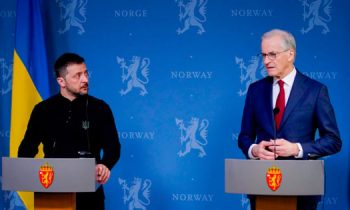This year’s Nobel Prize in Literature has been awarded to Norwegian author Jon Fosse, whose plays are among the most widely staged of any contemporary playwright in Europe.
The jury said Fosse, who has written about 40 plays, as well as novels, poems, stories, essays, and children’s books, won “for his innovative plays and prose which give voice to the unsayable”.

Reacting to the news on Thursday, Fosse said he was “overwhelmed, and somewhat frightened”.
“I see this as an award to the literature that first and foremost aims to be literature, without other considerations,” he said.
‘New Norwegian’
Anders Olsson, chairman of the Nobel Literature Committee, said Fosse’s work is rooted “in the language and nature of his Norwegian background”.
Fosse, 64, who writes in the least common of the two official versions of Norwegian, said he regarded the award as a recognition of this language and the movement promoting it, and that he ultimately owed the prize to the language itself.
Known as “new Norwegian” and used by about 10 per cent of the country’s population, the version of the language used by Fosse was developed in the 19th century with rural dialects at its base, making it an alternative to the dominant use of Danish that followed from a 400-year union with Denmark.
His work has been translated into more than 40 languages, and there have been more than 1,000 productions of his plays.
Born among the fjords of western Norway, Fosse is usually seen clad in black with a few days’ stubble.
After studying literature, he made his debut in 1983 with the novel Red, Black which moves back and forth in time and between perspectives.
His major works include Boathouse (1989), which was well received by critics, and Melancholy I and II (1995-1996).
His latest book, Septology, a semi-autobiographical magnum opus – seven parts spread across three volumes about a man who meets another version of himself – runs to 1,250 pages without a single full stop.
The third volume was shortlisted for the 2022 International Booker Prize.
Struggling to make ends meet as an author in the early 1990s, Fosse was asked to write the start of a play.
“It was the first time I had ever tried my hand at this kind of work, and it was the biggest surprise of my life as a writer. I knew, I felt, that this kind of writing was made for me,” he once said in an interview with a French theatre website.
He enjoyed the form so much that he wrote the entire play, entitled Someone is Going to Come. His breakthrough as a dramatist came with Claude Regy’s 1999 Paris production of that work.
The jury said Fosse’s work “presents everyday situations that are instantly recognisable in our own lives”.
It added: “His radical reduction of language and dramatic action expresses the most powerful human emotions of anxiety and powerlessness in the simplest terms.
“It is through laureate Jon Fosse’s ability to evoke man’s loss of orientation, and how this paradoxically can provide access to a deeper experience close to divinity, that he has come to be regarded as a major innovator in contemporary theatre.”
Asked almost 10 years ago whether he would like to win the Nobel Prize, Mr Fosse told The Guardian “of course” he would.
“But the simple truth is that I was very pleased when the news came that it wasn’t me. Normally, they give it to very old writers, and there’s a wisdom to that – you receive it when it won’t affect your writing,” he said.
Last year, the award was won by French author Annie Ernaux, for what the Swedish Academy called “the courage and clinical acuity” of books rooted in her small-town background in Normandy, in north-west France.
She was only the 17th woman among the 119 Nobel literary laureates.
Previous winners include Toni Morrison, Ernest Hemingway and Jean-Paul Sartre, who turned down the prize in 1964.
The Literature Prize is the fourth Nobel award of the 2023 season, which began on Monday when Hungarian-American Katalin Kariko and American Drew Weissman both won the Nobel Prize in Medicine for discoveries that enabled the creation of mRNA vaccines against Covid-19.
On Tuesday, the physics prize went to French-Swedish physicist Anne L’Huillier, French scientist Pierre Agostini and Hungarian-born Ferenc Krausz for producing the first split-second glimpse into the superfast world of spinning electrons.
On Wednesday, the chemistry prize was awarded to Moungi Bawendi of MIT, Louis Brus of Columbia University, and Alexei Ekimov of Nanocrystals Technology. They were honoured for their work with particles called quantum dots – tiny particles that can release very bright-coloured light and whose applications in everyday life include electronics and medical imaging.
The Nobel Peace Prize will be announced on Friday, followed by the Nobel Memorial Prize in Economic Sciences, on Monday, rounding out the awards season.
The Nobel Prize carries a cash award of 11 million Swedish kronor ($1 million) from a bequest left by the prize’s creator, Swedish inventor Alfred Nobel.
Winners will also receive an 18-carat gold medal and diploma when they collect their Nobel prizes at the award ceremonies in December.



